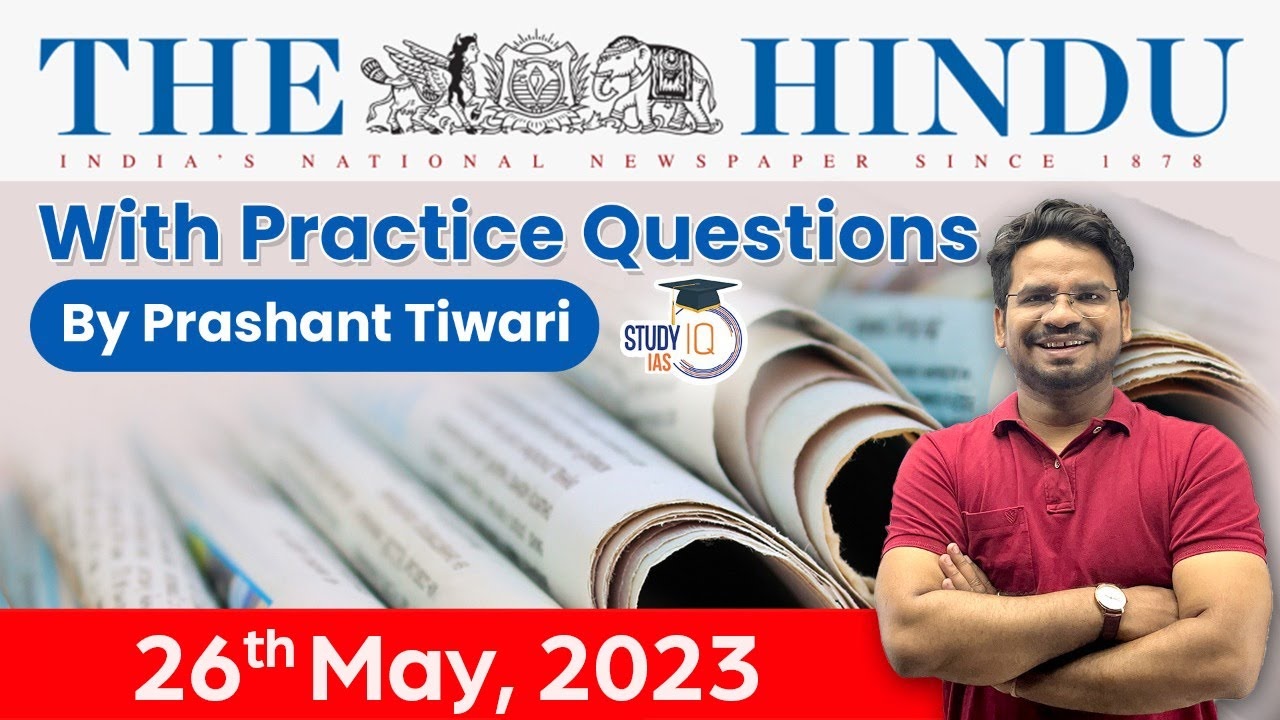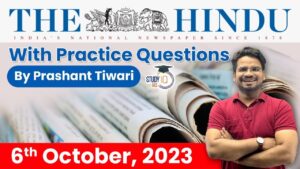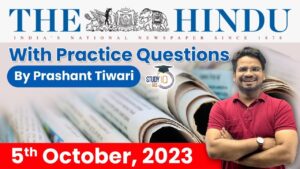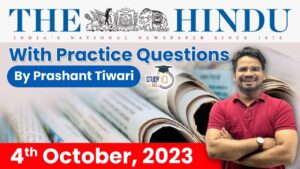The Hindu Newspaper Analysis for UPSC

The Hindu Newspaper Analysis 25 May 2023
- If India’s insurance regulator’s plans fructify, households across the country could soon be able to get an affordable single policy that covers health, life, property and accident, get their claims settled within hours, and even secure value-added services at the time of buying a policy.
- In an ambitious bid to expand the poor insurance penetration in the country, the Insurance Regulatory and Development Authority (IRDA) is devising a new affordable bundled product to give citizens protection against multiple risks, and seeking to expedite claim settlements by linking death registries onto a common industry platform.
- These initiatives are part of a broader overhaul — including legislative amendments to attract more investments through differentiated licences for niche players similar to the banking sector — with an eye on making insurance “available, affordable and accessible” to all citizens with a “gram panchayat- to district- to State-level’ approach.
Insurance Regulatory and Development Authority of India (IRDAI):
- It is an autonomous and statutory body established under the IRDA Act 1999.
- It is the apex body that supervises and regulates the insurance sector in India.
- Objective: To protect the interests of policyholders, to regulate, promote and ensure orderly growth of the insurance industry in India.
- Nodal Ministry: Ministry of Finance
- Head Office: Hyderabad.
- Composition: IRDAI is a 10-member body- a Chairman, five full-time members, and four part-time members appointed by the Government of India.


- China is continuing to expand the network of model villages, or Xiaokang (moderately prosperous) villages, opposite the Line of Actual Control (LAC) in the Middle and Eastern sectors, according to official sources.
- Opposite Barahoti, the Chinese are building villages at a rapid pace, sometimes 300 to 400 houses within 90 to 100 days, a source said. People’s Liberation Army patrols have been observed every 15 days or so as against once in a season earlier, the source said.
- In Arunachal Pradesh, opposite the Kameng area, two villages have come up in Cuna country consisting of 41 dwelling units and there are about 200 inhabitants from the Menba ethnic community, the source said. There is a military complex adjacent to the village consisting of multi-storey buildings secured by a perimeter wall with CCTVs and watch towers, the source added.

- the ordinance promulgated under Article 123 of the Constitution to expand the scope of excepted matters in Article 239AA(3)(a) is void ab initio and is liable to be struck down for bypassing constitutional amendment. It amounts to a colourable exercise of power. Article 123 is no substitute for Article 368 (amendment of the Constitution) in Part XX.
- In the landmark seven-judge Bench verdict of the Supreme Court in the matter of Krishna Kumar Singh vs State of Bihar (2017) 2 SCC 136, the Court held that the satisfaction of the President under Article 123 is not immune from judicial scrutiny; powers under Article 123 is not a parallel source of law making or an independent legislative authority.

- The theme at the Global Solutions Summit in Berlin on May 15 and 16 this year, was a new paradigm for the economy. Its backdrop was the rising tensions in the east between the United States and China, and the war in the west between the North Atlantic Treaty Organization (NATO) and Russia.
- Military wars are being couched as wars between democracy and autocracy.
- The G-7, representing 15% of the world’s citizens, who are ostensibly on the side of democracy, are autocratically and undemocratically twisting the arms of other governments (representing 85% of the people) to take their side.
- Governance of all countries, whether its leaders are democratic or autocratic, must be for the benefit of common citizens — not to benefit financial investors. Ease of living of the poorest citizens and reduction of precarity in their lives must be the principal measures of good governance; not ease of doing business and reduction of risks of financial investors.
- “Subsidies” for the poor became bad, while “incentives” for investors were good.
- The model of economic growth that has guided national and international policies since the 1990s will not create healthy democracies. Economics needs urgent reform to guide progress towards universal social, and ecological well-being. All Indian political parties must concentrate on the economy for the sake of the people. Indian economists too must rethink the paradigm of economics and concentrate on the requirements of the lower 50% of the pyramid, and not trust wealth to trickle down on its own.

- Two more cheetah cubs died and one is unwell at the Kuno National Park (KNP) in Madhya Pradesh. One cub died on Tuesday.
- The extreme heat and the lack of adequate nutrition have likely contributed to the death of the two-month-old cubs, say experts associated with the cheetah reintroduction project. With this, only one cub of the litter of four born to the Namibian cheetah Jwala is now alive.
- Three adult cheetahs died since 20 of the animals were relocated from Namibia and South Africa to the park, in an experiment at establishing a community of cheetahs.

- Aimed at curbing adulteration of milk and milk products, in both organised and unorganised sectors in all the districts of the States and Union Territories, the Food Safety and Standards Authority of India (FSSAI) will conduct nationwide surveillance this year.
- The announcement on Thursday comes against the backdrop of the country facing an alleged milk shortage with cooperatives reporting only a 1-2% increase in production this year and organised and unorganised sector pointing to registering stagnation.
- The sector also continues to grapple with the hit it took during COVID-19 and more recently the lumpy skin disease (which caused the death of 1.9 lakh cattle) and fodder inflation at 30%.
- India is ranked 1st in milk production contributing 23 percent of global milk production.
- About Food Safety and Standards Authority of India (FSSAI):
- It has been established under Food Safety and Standards , 2006 which consolidates various acts and orders that have hitherto handled food related issues in various Ministries and Departments.
- FSSAI has been created for laying down science based standards for articles of food and to regulate their manufacture, storage, distribution, sale and import to ensure availability of safe and wholesome food for human consumption.
- Ministry of Health and Family Welfare, Government of India is the Administrative Ministry for the implementation of FSSAI.
- The Chairperson and Chief Executive Officer of Food Safety and Standards Authority of India (FSSAI) are appointed by Government of India.
- The Chairperson is in the rank of Secretary to Government of India.
- Headquarters: Delhi

- State-sponsored Chinese hackers have infiltrated critical U.S. infrastructure networks, Washington, its Western allies and Microsoft said on Wednesday while warning that similar espionage attacks could be occurring globally.
- Microsoft highlighted Guam, a U.S. territory in the Pacific Ocean with a vital military outpost, as one of the targets, but said “malicious” activity had also been detected elsewhere in the U.S.
- Microsoft’s statement coincided with an advisory released by U.S., Australian, Canadian, New Zealand and U.K. authorities warning that the hacking was likely occurring globally.
- About:
- Name: The Five Eyes name refers to the security classification of intelligence documents: “SECRET – AUS/CAN/N.Z./U.K./U.S. EYES ONLY” or “FVEY.”
- What is it? It is an anglophone intelligence alliance comprising Australia, Canada, New Zealand, the United Kingdom and the United States.
- History: It began in 1946 when the United States and the United Kingdom agreed to an open exchange of intelligence on the communications of foreign nations. It was expanded when Canada joined the alliance in 1948, followed by Australia and New Zealand in 1956.
- Functioning: Five Eyes allowed the national agencies to share monitoring infrastructure, and to track nuclear-armed Soviet submarines during the Cold War. The surveillance partnership strengthened following the 9/11 attacks on the United States, and monitoring of internet communications has since expanded exponentially.

- Whenever there is a potential conflict of interest, a judge can withdraw from a case to prevent the perception that the judge was biased while deciding a case.
- There are two kinds of recusals — an automatic recusal where a judge himself withdraws from the case, or when a party raises a plea for recusal highlighting the possibility of bias or personal interest of the judge in the case.
- The decision to recuse rests solely on the conscience and discretion of the judge and no party can compel a judge to withdraw from a case. Since there are no statutory rules governing the process, it is often left to the judges themselves to record reasons for recusals.
- In Ranjit Thakur versus Union of India (1987), the SC held that to determine if a judge should recuse, what is relevant is the reasonableness of the apprehension of bias in the mind of the concerned party. “The proper approach for the Judge is not to look at his own mind and ask himself, however honestly, “Am I biased?” but to look at the mind of the party before him,” the Court ruled.
- The SC in State of West Bengal versus Shivananda Pathak (1998), defined judicial bias as a “preconceived opinion or a predisposition or predetermination to decide a case or an issue in a particular manner, so much so that such predisposition does not leave the mind open to conviction”. Thus, it is a condition of mind which renders the judge incapable of impartiality in a particular case, the Court explained.


 The Hindu Newspaper Analysis 6 October 2...
The Hindu Newspaper Analysis 6 October 2...
 The Hindu Newspaper Analysis 5 October 2...
The Hindu Newspaper Analysis 5 October 2...
 The Hindu Newspaper Analysis 4 October 2...
The Hindu Newspaper Analysis 4 October 2...





















